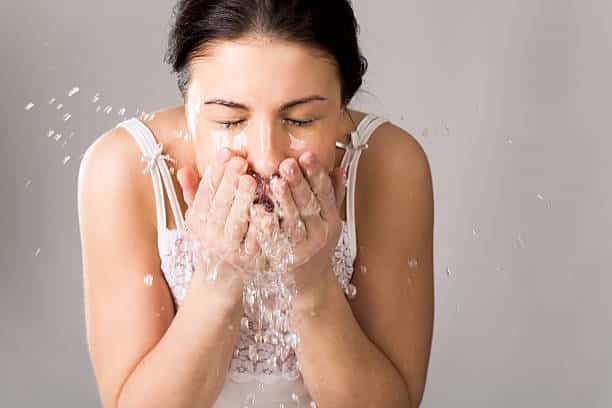You may believe you are following the greatest skin care practices: Every day, you use a facial cleanser, moisturizer, and eye cream, and you never leave the house without applying broad-spectrum sunscreen.
You appear to be checking the appropriate skin care boxes, but the finest skincare routine is all about the details, as with many things. First, of course, you begin your skincare routine by washing your face, but the type of water you use may be just as crucial as the facial cleanser you select.

That doesn’t mean you have to buy bottled or sparkling water—your skin isn’t that picky—but the water you use to wash your face has to be just the proper temperature. Continue reading to find out how water temperature affects your complexion and our top recommendations on where to adjust the dial.
What effects does hot water have on your skin?
While a hot shower or face washing session may seem soothing at the time, it is not the ideal solution for your skin.
After cleansing, scalding hot water might cause increased skin irritation. Worse, excessively hot water can dry up your skin, robbing it of essential natural oils.
This is especially uncomfortable if you already have dry skin, but it is also undesirable for individuals with oily skin.
If you have oily skin, your skin may react to having its natural oils stripped by producing even more oil, making you appear excessively shiny.
What effect does cold water have on your skin?
When you use cold water, it acts as an astringent, causing your skin to retract briefly.
This is beneficial if you have puffy-looking skin that could benefit from tightening, particularly around your under-eye area. In addition, splashing cold water on your face can both wake you up and feel pleasant on your skin.
You should attempt to avoid cleaning your skin with cold water and solely cold water.
Keep in mind that variety is the spice of life. It’s OK occasionally, especially at the end of your washing routine, but it’s not always ideal for your skin.
So, what is the optimal water temperature for your skin?
To achieve the ideal temperature, you will not need to sit at the sink with a thermometer, but you will need to adjust the dial. Adjust the temperature halfway between hot and cold—lukewarm is excellent.
This temperature produces the best skin care effects!
The American Academy of Dermatology recommends using moderately warm water for the greatest face-washing experience and general skin health.
According to Dr. Rivera, most skin care products were tested or produced with this optimal temperature in mind. Dr. Rivera further mentions that lukewarm water can help guarantee that your facial cleanser has enough foaming action, eliminates enough filth from the surface of your skin, and properly balances your natural skin oils.
It suddenly appears to be a no-brainer to use lukewarm water!
Your skin and water
Your skin is a type of organ.
It is, in fact, the largest organ in your body, and it is primarily formed of water. Therefore, your skin cannot function properly without water. If you don’t drink enough water, your skin will not only get dry, tight, and flaky, but it will also grow more prone to aging.
The truth is that your body loses a lot of water every day, and if you don’t replace it by drinking more water, your skin will suffer. The noticeable difference that hydration can make for your skin is clear.
Are you still not convinced?
Check out these incredible skin advantages of drinking more water.
Why you should quit washing your face with tap water
With an average pH of 7, tap water will likely irritate your skin.
The pH scale determines the acidity or alkalinity of a water-soluble substance (such as the surface of your skin or water). A higher pH value indicates that the environment is more alkaline; a lower pH number indicates that the environment is more acidic.
Your skin’s pH should be less than 5, around 4.7 when it’s happy. Slapping your face with more alkaline water could harm your skin. This does not even take into account the type of water that may be in your pipes.
Your water may be hard, which means it has more minerals than usual, specifically calcium, magnesium, and iron. However, it can also be soft, indicating that it contains fewer minerals than usual. While these minerals are generally safe to consume, they can cause skin breakouts, dryness, and irritation. It may also aggravate dermatitis, eczema, and psoriasis.
You can ask your water supplier or purchase an at-home pH test or a water hardness test to determine the pH of your water and whether it is soft or hard. You can then select whether or not to purchase a showerhead water filter.
However, the water in your sink may be a little harder.
If tap water irritates your skin, you should try a different washing method, such as bottled water or pasteurized milk, or use a water softener for optimal skin care.

Jay
Jay is a health and wellness enthusiast with expertise in water quality and nutrition. As a knowledgeable advocate for holistic well-being, Jay successfully manages Type 2 Diabetes through informed lifestyle choices. Committed to sharing reliable and authoritative insights, Jay combines firsthand experience with a passion for enhancing health."
